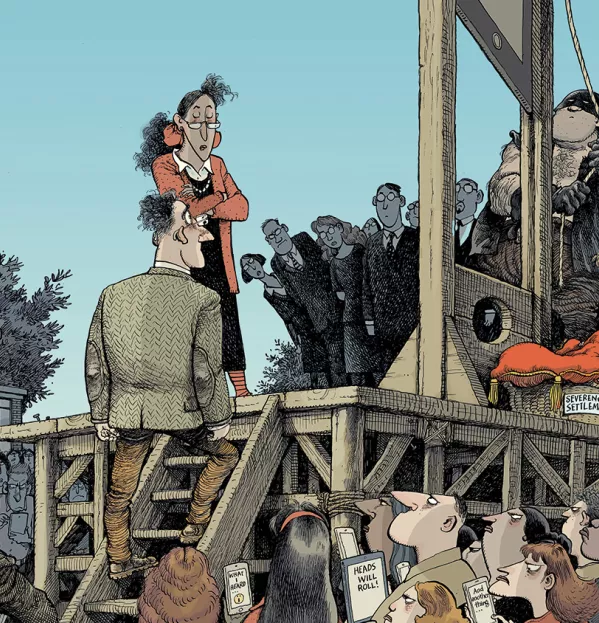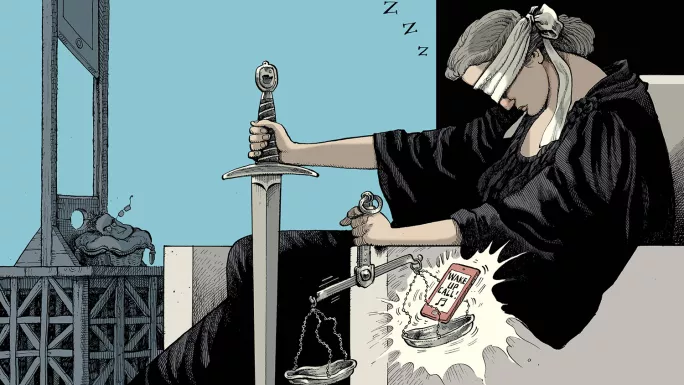Too many heads on the block

Heads are vulnerable: more so now than they ever have been. Over the past few years, I’ve witnessed more heads than I care to count experiencing sudden and shocking threats to their careers and wellbeing. Many have lost their jobs through no - or virtually no - fault of their own. Most of these have been successful heads with excellent track records. Some have just “disappeared” - at least, as far as their staff and parents are concerned.
What’s happening?
Fundamentally, the issue is an existential one and there are several drivers. The first is fear. It takes the form of extreme risk aversion. Rather than acting in a calm and considered way, and with a modicum of common sense, those with the authority (governing bodies, local authorities and multi-academy trust hierarchies) can be triggered into making knee-jerk reactions. Why? Because they are terrified of not being seen to act swiftly and robustly when, say, an accusation has been made against the school leader.
Rather than making a calm assessment, checking whether there is anything to investigate, and responding proportionately and temperately, the reaction is precipitous, unjustifiable and often plain stupid.

It’s as though those concerned are unable to imagine anything other than the worst-case definition of the situation. Their catastrophising perspective leads to that head getting suspended (almost never the neutral act it’s meant to be) and/or investigated at the merest whiff of something amiss.
Here’s just one real-life example. A very experienced headteacher was accused of “attacking” a child. The accuser claimed to have observed this as he was passing her office window, although more than one adult was present in the office and it transpired that the witness was not even certain who the head was. Despite several attempts to engage the “witness”, he refused to back up his original charge or to play any part in an investigation. Neither the child concerned nor the child’s parents made any complaint. Any right-minded person would conclude “matter closed”: not so much “no case to answer” as “nothing here to investigate”.
That’s not what happened. The local authority launched an investigation involving more and more parties. As is so often the case in such situations, the investigation was protracted and it drifted. Those prosecuting it seemed clueless about how to bring it to a close. Needless to say, the poor head concerned was dismayed, stressed and fearful of her fate. It took many months for the situation to be semi-resolved, but the head still feels like a marked woman and knows that there could still be repercussions further down the line.
This story is not exceptional. I’ve encountered many others in which school leaders have become the casualties not just of false or vexatious allegations, but of fear-driven reactions to them. Ultra-risk-aversion displaces common sense and fairness, and allows something to be made of nothing.
Here’s the critical point that many of those with authority over school leaders are failing to grasp: judgements and reactions driven by fear and extreme risk-aversion are very often poor judgements. They can be every bit as damaging as judgements and actions resulting from showing too little caution.
What local authorities, governing bodies and academy authorities need is a range of response options so that suspension and investigation are not the knee-jerk default reactions they are fast becoming.
One obvious option would be to take a common-sense conversation; it can be as simple as that. In one situation I’ve encountered, one head - suspended and finally bundled off into the wilderness on the flimsiest grounds of disqualification by association - could still be in post had she had the opportunity to talk through the matter concerned. It could so easily have been sorted.
Knowing when to stop
Another option would be just checking to make sure that what has been deemed to need investigation actually exists. It simply can’t be right to suspend a head on the basis of a rumoured story for which no amount of investigation would reveal what wasn’t there.
A third would be to issue a clarifying statement - for example, when a complainant has inadvertently or deliberately misunderstood something. That option would have been appropriate, for example, with regard to the headteacher who was accused of a disability hate crime for saying that one of her pupils had special educational needs; it would also have saved the poor head concerned six months of anguish and distraction.
Whichever option is chosen, the starting point should always be the determination (a) not to get things out of perspective, and (b) not to overreact by rushing into a heavy-handed, ill-thought-through and potentially reputation-damaging process. In my experience, that process can too often be characterised as “fishing, floundering and failing” - failing the unfortunate school leader who has done little or nothing to warrant what he or she is being subjected to.
Clearly, when there are matters of substance to investigate, then investigations must be undertaken. This goes without saying. But those undertaking investigations should also know how and when to bring them to a stop, and have the nous and integrity to do so if there is nothing to warrant further investment of time and effort.
There is a second driver for the increasing incidence of school leaders experiencing reputation-damaging or even career-ending events: the amplifying and other deleterious effects of social media. Minor issues can so easily mushroom into major ones; parents and others can quickly spread their disgruntlement; and disgruntlement can be deliberately modulated into outrage. Very often the school and its leaders have no opportunity to deal with a complaint or accusation before it has been shared with the world and his wife on Facebook or some other social media platform.
Ill-prepared heads have then to respond to a situation that may already have been blown way out of proportion. If they are stressed and rushed, then their response can be ill-judged. Even if it’s not, they might find themselves trying to cope with a draining roller-coaster of a situation that can be seriously harming to them and their school.
Avoiding social media spirals
One of many examples I could cite involves a primary school that was seriously disrupted over many months by a social media campaign directed against the head and other senior staff. It was triggered by a minor behavioural issue that could almost certainly have been dealt with in a no-fuss manner had the parents chosen to take their concern to the school.
Instead, they took it to social media; it then escalated rapidly and spiralled out of all proportion. The head now knows that she unwittingly contributed to that spiral by saying more than she needed to. But hindsight is a wonderful thing.
The matter was picked up by the press and broadcast media, and the senior leadership team had a torrid, stressful and distracting time for the best part of a year.
I truly wish I could say that the relevant unions were always robust champions for their unfortunate members in situations such as these, but I can’t. Sometimes their actions suggest that they work on the assumption that once a school leader has been suspended and/or subject to an investigation, that he or she is mortally wounded.
Sadly, their responses can be fatalistic, or that’s how it is often experienced by those concerned. The stance is captured in the comment of one union official: “The outcome is inevitable, so it’s about getting you the best possible settlement”, ie, a pay-off.
School leaders today are often the unjustified targets of other people’s ramped-up and widely disseminated outrage. What they need is the absolute assurance that if they did find themselves treated with almost inexplicable shabbiness, then their union would remonstrate with outrage on their behalf. They need that remonstration to be full-blooded and applied at the earliest stage possible.
This approach won’t stop bad things from happening to good school leaders, and they will still need advice about how to prevent, prepare for and respond to bad things if they do happen, but at least it would make sleeping at night just that little bit easier.
Dr Mike Waters is author of Stopping Bad Things Happening to Good Schools and Good School Leaders
You need a Tes subscription to read this article
Subscribe now to read this article and get other subscriber-only content:
- Unlimited access to all Tes magazine content
- Exclusive subscriber-only stories
- Award-winning email newsletters
Already a subscriber? Log in
You need a subscription to read this article
Subscribe now to read this article and get other subscriber-only content, including:
- Unlimited access to all Tes magazine content
- Exclusive subscriber-only stories
- Award-winning email newsletters